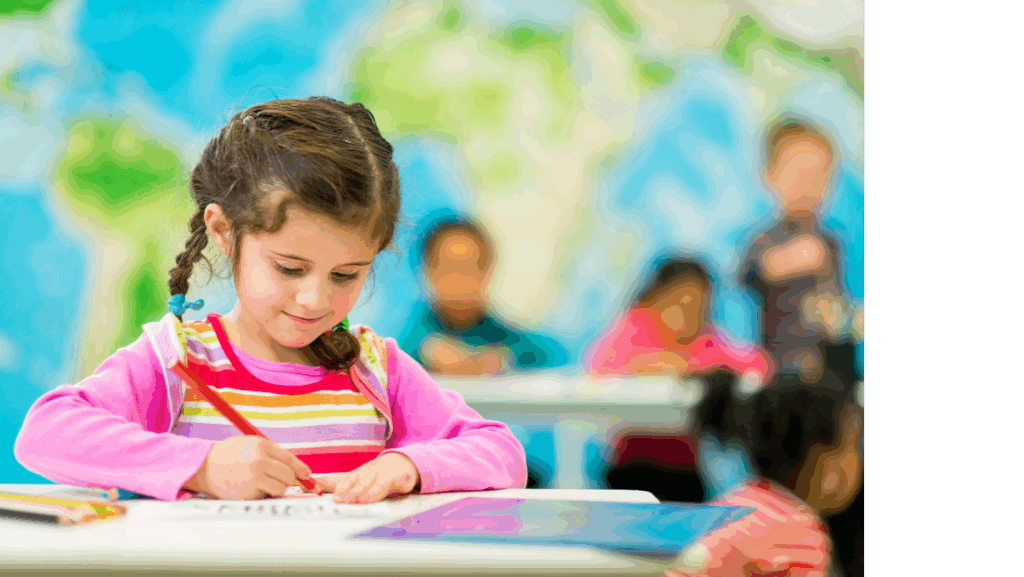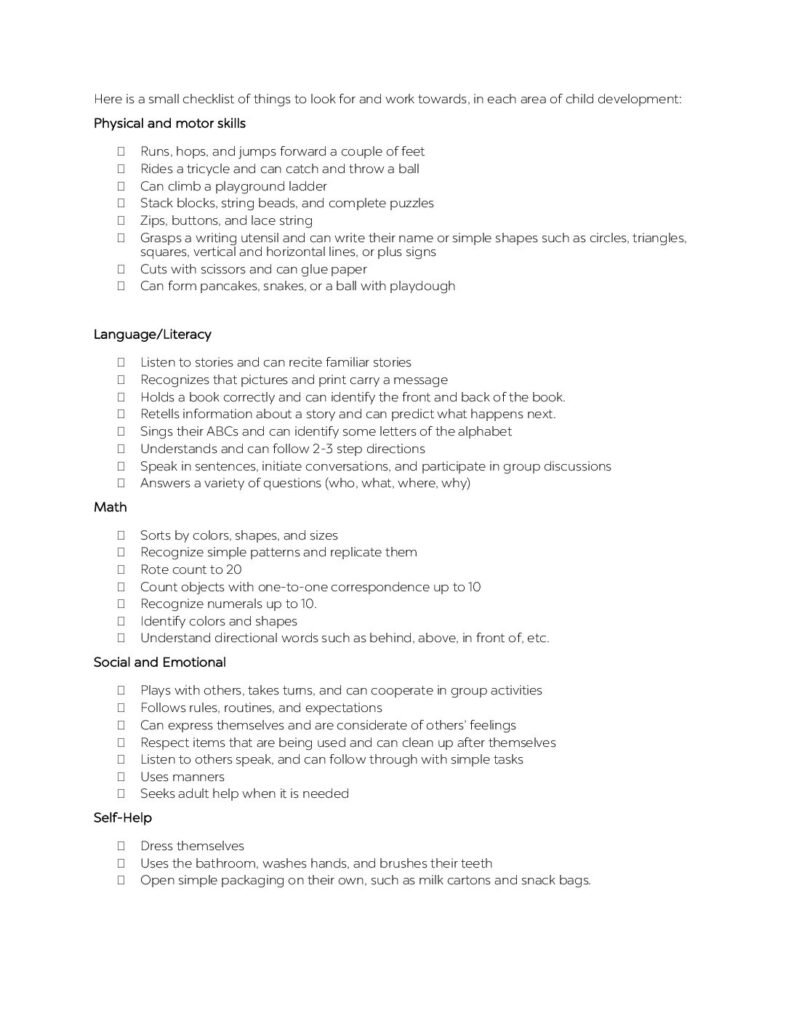Kindergarten is an exciting time, yet it can be met with mixed emotions for both the caregiver and the child. For us parents, it is a bittersweet moment. We are in shock at how big our babies got so quickly, like, where did that time go? Yet we are so proud of who they have become.

Around this time of year, caregivers may start to wonder if their child is ready to start kindergarten. Usually, these concerns stem from their child not knowing certain academic-related topics. However, kindergarten readiness is so much more than that, and many Early childhood professionals will argue that the most important skills children need are social/emotional and self-help skills, as well as having curiosity, rather than knowing their ABCs and 123s. These skills start to develop way before a child is four or five years old; they start in infancy.
Social and emotional skills are the ability to understand, manage, and regulate one’s emotional state; the ability to interact with others in social situations; and to build and maintain positive relationships. Social and emotional skills set the foundation for all other learning and development. Loving relationships and attachments with caregivers are the key for children to develop social and emotional skills.
Infants’ emotional states, when they first enter the world, are often related to the sensations that they feel. They cry when they feel the unpleasant sense of hunger or when the room is too noisy for their ears. As their caregiver responds to their cues and feeds them, comforts them, and is sensitive to their needs, they begin to learn how to regulate such emotional states: “I’m hungry, but I hear mom, and I know that she will feed me soon.” Having this attachment to a caregiver will then motivate the infant to engage in a shared world (usually around 4 months) that is not just focused on what they are feeling internally, but what is happening on the outside. This gives them the initiative to engage with their caregiver to get a reaction from them: “If I smile and coo at my dad, he will smile back at me.” As well as engage with materials in their world: “I wonder what that feels and tastes like?”
To help infants develop social and emotional skills, it is important to be warm and nurturing, anticipate and respond to their needs and cues, provide structure and routine, and provide physical and emotional comfort when they are in distress by holding, rocking, and talking to them calmly. Communication, engagement, and play are important at every stage of life; back-and-forth interactions (also called give and take, reciprocal communication, and circles of communication) are vital for brain development and social and emotional skills.
Here are some activities to do with babies to promote development:
- Talking, singing, and reading stories to them.
- Narrate what is going on around them, describe what they are seeing or doing.
- Playing hide and seek, or hiding a small object that you can look for together.
- Look at pictures together and label the items or people in the picture.
- Ask the baby questions, pause for their response, and respond back to them (back-and-forth interactions).
Toddler years are a challenging time. Toddlers are often conflicted between wanting to be independent and doing things on their own (yet not always being capable) and still wanting to be the baby. Usually tied to this are strong, big emotions that they are unable to manage and understand. This is where tantrums and power struggles make their appearance. Children do not always have the words to express their feelings, and their feelings are too overwhelming for them to regulate on their own. Children need their caregivers to be responsive and to meet them with calmness when they are overwhelmed by these strong emotions. To avoid power struggles, offer simple choices that you are happy with: “Do you want the blue cup or the red cup?” Use positive reinforcement to praise them when they do something you want, and be specific, “Thank you for picking up and putting your toys away, great job!” Use the grandma rule (Premack Principle) to get your child to do an undesirable task before doing something they want: “First, let’s eat our food, and then we can go play with our truck.” Also, be clear and consistent with rules and limitations, as well as being realistic with what you expect for your toddler.
Toddlers will use their caregiver as a secure base from which they can go off and independently explore and play in their environment, but then can go back to in times of need. Allowing such exploration promotes independence and problem-solving skills. However, it is still extremely important for engagement. As toddlers start getting a better understanding of themselves as individuals, this is a great time for you to talk about and teach emotional vocabulary. You can do this with your toddler by labeling and validating their emotions (never belittle them for how they feel; we are all entitled to our feelings) and helping them regulate. Pretend play is also a great way to explore feelings. Remember, you are your child’s role model. They will watch everything you do and repeat those actions, whether it is through role play or in social situations. Show your child acceptable ways of handling their feelings.
Toddlers need opportunities to play with other children to encourage relationships and early friendships. This is a great time to start introducing the concept of turn-taking; however, be mindful that toddlers may not fully understand sharing. You can introduce this concept by doing an activity such as rolling a ball back and forth and verbally stating when it is your turn and when it is their turn while playing. Playing with others and talking to your child about how other children are feeling helps them to learn empathy. Nothing is cuter than a toddler hugging another toddler to make them feel better!
Here are activities you can do with your toddler to promote development:
- Read and sing to them. They love fingerplay songs and will do the movements. (Itsy Bitsy Spider; Wheels on the Bus; Five Little Ducks)
- Create stories with puppets
- Turn-taking games
- Playing with them. Pretend play, building towers, playing musical instruments, and dancing to songs. Let your child take the lead on what they want to do.
Preschool-age children are usually more skilled than toddlers at managing their emotions; however, they still need help. Emotional literacy is the ability to label and talk about their feelings as well as the feelings of others. Teaching emotional literacy will help children be successful. After children have a sense of what they are feeling, you can teach them techniques to help them regulate their feelings, such as taking deep breaths, counting, or talking to an adult about how they feel. Children who can label, talk about, and regulate their feelings are more likely to focus in a classroom setting and follow through with classroom routines, activities, and expectations.
Children are learning the ins and outs of creating and maintaining friendships during these years. Preschoolers start to develop their own identity and realize that not everyone thinks the way they do. They have their own values, preferences, and interests, and will often form their friendships based on who shares those interests with them. They learn more about cooperating, taking turns, and how to respond to other children’s feelings. They are also gaining more impulse control and can wait for when it is their turn, and can listen to, remember, and follow multiple steps of instruction.
Preschoolers need routine and structure. Having a dependable routine allows them to know what is going to happen next, so that they can take part in that routine independently. Teach them how to put on their coat and how to button and zip. Teach them how to set the table, wash the floors, put their laundry away, etc. Allowing preschool children the opportunity to help with routine, chores, and other activities on their own, helps them with confidence and independent skills.
Here are activities you can do with your preschooler to promote development:
- Read to them. Extend your reading by asking them questions about the story. Avoid simple yes/no questions and ask them questions to get them to use their thinking skills.
- Play board games, do puzzles together, and color or do other art activities.
- Dance together, build a fort or obstacle course, play hopscotch outside, go on a scavenger hunt, or go for a walk and discuss the nature that you see together.
- Pretend playing, building with blocks, and playing hide and seek.
- Involve your child in household chores such as folding clothes, doing the dishes, sweeping and mopping, and cooking.
Overall, spend time with your children and make learning fun and exciting, teach them these social and emotional skills, and they will be ready! However, as a mother, I know what it is like to worry about whether your child is ready for kindergarten.
About the Author:
My name is Jessica Sparrow. I have worked with children of various age groups for 10 years, but mainly with infants, toddlers, twos, and preschoolers. I am also a mother of two boys, ages 10 and 2. I have my B.A. in Early Childhood Education, and I am currently working on my master’s degree with a concentration in Early Intervention with an Infant and Early Childhood Mental Health certificate.

